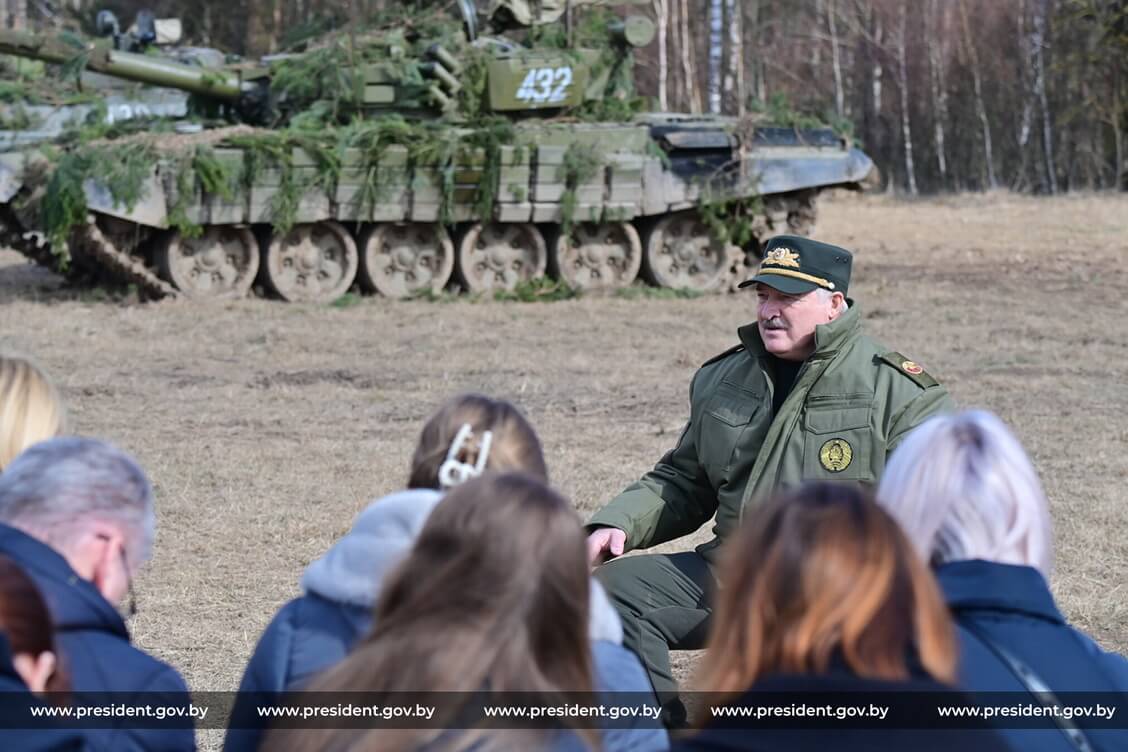On April 8, Alaksandar Łukašenka portrayed himself as a defender of Belarus from a war that his opponents allegedly want to unleash under pressure from their Western curators, as he gave instructions to Uładzimier Piarcoŭ, the newly appointed propaganda chief at his administration.

Piarcoŭ, a former minister of information, said that Łukašenka had given him “specific tasks on propaganda and counter-propaganda.”
Opponents cast as terrorists, neighbors as aggressors
The exiled opponents of the regime are conducting “what we would mildly call informational and psychological operations” against Belarus, the Belarusian leader said. “This is what they are betting on. But their handlers are encouraging them to go for armed confrontation.” They “need something hotter . . . like Moscow’s Crocus City Hall,” he noted.
Belarusian propaganda always lacks logic and is designed for blind emotion, and in this case, too, it is unclear how a terrorist attack on civilians could facilitate an alleged invasion.
On the one hand, Łukašenka wants to belittle and denigrate his political opponents, portraying them as thieves wearing expensive watches, pathetic and insignificant individuals who are not so eager to fight but rather indulge in foul talk about Belarus.
On the other, he demonizes them, claiming that their “goal is to invade Belarus and seize at least a small piece of land, to declare their power and call in foreign troops, not even mercenaries.”
It was not the first time Łukašenka aired the false story.
In 2020, he defended the brutal crackdown on peaceful demonstrators, saying that if his opponents seized power even for a day, NATO troops would immediately arrive, provoking Russia and eventually triggering a world war.
He portrays himself as a victim and a savior of humanity from a nuclear apocalypse to justify his holding on power and rolling back freedoms.
Violent scenario
Critically thinking public clearly understands that he is just scaremongering.
The force of arms is indeed popular among radical opponents. Some are convinced that this is the only way to defeat the deeply entrenched regime. But even radicals concede that they lack strength for it now.
Referring to the Kastuś Kalinoŭski regiment (KKR) fighting alongside Ukrainian troops, Łukašenka said: “There are over a hundred people there. And we know how they fight.”
If they are indeed a little more than a hundred, and they do not fight so well, why worry?
Belarusians are said to have set up militarized patriotic clubs in Poland and Lithuania, but apparently their membership is small and they do not have combat weapons.
Warsaw and Vilnius would never supply arms to these units or allow them to attack Belarus from their territory.
Łukašenka’s claim that NATO just needs an excuse to invade Belarus does not hold water.
A few days ago he said that the Lithuanians were digging anti-tank trenches, which means that they are actually preparing to defend.
Moreover, the Baltic states are worried that NATO might hesitate to invoke the collective defense article if Russia or Russia and Belarus attack.
In Ukraine, the West seems reluctant to go too far with military aid.
French President Emmanuel Macron’s recent comment on possible deployment of French troops to Ukraine have been met with criticism in Europe.
Cautious Europeans do their best to avoid a clash with Russia, fearing its nuclear power.
Łukašenka presents himself as peacemaker
The number of KKR fighters cited by Łukašenka differs significantly from nearly 5,000 quoted by KKR commander Dzianis Procharaŭ in March. Both sides might engage in propaganda.
And it is not even about numbers. Kyiv pursues clearly different policies towards Moscow and Minsk as it tries to keep the Belarusian army at bay.
Russian units fighting for Ukraine are conducting daring operations in Russia’s Belgorod, Kursk and Bryansk provinces, while the Ukrainian command would not give the KKR the green light for military operations in Belarus.
Łukašenka understands perfectly well that Kyiv is not interested in breaking this status quo.
He realizes that negotiations are possible in the near future, for example, if Donald Trump comes to power in the United States and delivers on his promise to persuade Moscow and Kyiv to stop hostilities.
The Belarusian leader is eager to play a role in possible talks. “In this situation, when two countries, actually one nation, have clashed head-on, a third force is always needed,” he said.
However, Kyiv and its allies do not regard him as a neutral side or a trustworthy mediator.
In the run-up to the 2025 presidential election, Łukašenka wants to act as an international peace broker or at least as a wise and strong guardian of peace in Belarus. At this point, he may want to distance himself from Russia’s military adventure.